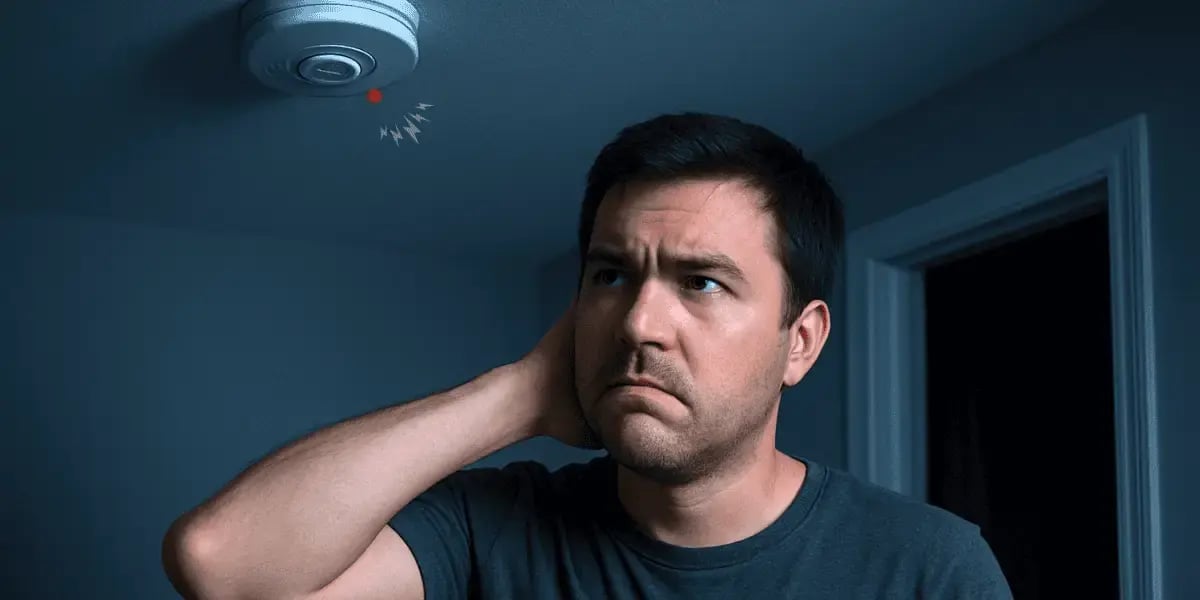Battery vs. Hardwired Smoke Alarms: Which Is Best for Your Home?
August 7th, 2025
4 min read

You’ve been told it’s time to replace your smoke alarms, but now you’re stuck trying to figure out which kind to get.
Maybe you’re in the middle of a remodel. Perhaps an inspector flagged your current alarms. Or maybe an electrician told you your system isn’t up to code. Either way, what seemed like a simple task has suddenly turned into a decision you didn’t expect: battery-powered or hardwired?
At first glance, it appears to be a minor detail. But then the questions start to pile up. Which one is safer? Are there rules about what you can or can’t use? Does it matter what kind of house you live in?
At Integra Electrical, we help homeowners across the Des Moines area make this exact decision every day, especially in older homes.
In this article, we’ll break down
- The differences between battery and hardwired smoke alarms
- What the Iowa Code says about smoke alarms
- The frequently asked questions about the battery and hardwired smoke alarms
So you can choose what works best for your home and feel good about the decision.
What’s the Difference Between Battery and Hardwired Smoke Alarms?
Battery-Powered Smoke Alarms -These alarms run entirely on batteries and don’t connect to your home’s electrical system. They operate independently and are typically mounted on ceilings or walls.
Hardwired Smoke Alarms - These alarms are connected directly to your home’s electrical wiring and often include a battery backup. They’re commonly installed in newer homes or during remodels to meet safety code requirements.
What are the Pros and Cons of Battery-Powered Smoke Alarms
Pros of Battery-Powered Smoke Alarms:
- Easy to install. No wiring required.
- Budget-friendly.
- Can be placed almost anywhere.
- Great for quick replacements in older homes.
Cons of Battery-Powered Smoke Alarms:
- 100% dependent on the battery. If it dies or gets removed, the alarm won’t work.
- Batteries need to be replaced regularly.
- Not interconnected. Alarms don’t all go off at the same time.
- Often installed in the wrong locations without proper guidance.
What are the Pros and Cons of Hardwired Smoke Alarms
Pros of Hardwired Smoke Alarms:
- Connected directly to your home’s power for consistent reliability.
- Typically interconnected. When one alarm goes off, they all do.
- Includes battery backup for power outages.
- Required for new construction and most remodels in Iowa.
Cons of Hardwired Smoke Alarms:
- Must be installed by a licensed electrician.
- May require cutting into walls or ceilings during installation.
- Not always an option in homes without existing wiring (without significant upgrades).
- Easier to forget about it if high up or aging. They still need to be tested and replaced over time.
What Does the Code Say About Smoke Alarms in Iowa?
Smoke alarm requirements aren’t just about preferences. They’re based on safety codes that protect your home and family. In Iowa, these rules are guided by the National Fire Protection Association (NFPA), the National Electrical Code (NEC), and state and local building codes
Here’s what’s typically required for Iowa homes:
- Smoke alarms must be installed inside every bedroom.
- There must be an alarm in the hallway outside of each sleeping area.
- You need at least one alarm on every level of the home, including basements.
- In new construction and major remodels, smoke alarms must be hardwired and interconnected, with a battery backup.
- If you're replacing alarms in an older home, battery-powered units may still be allowed, but the placement and quantity must still meet current code standards.
Cities like Des Moines, West Des Moines, Urbandale, and Ankeny often follow the International Residential Code (IRC), which mirrors these rules and may even enforce them more strictly during home sales, remodels, or permit inspections.
Even if your home isn’t under renovation, you can still upgrade to a hardwired system, and in most cases, it's the safest and most reliable option.
If you’re unsure what’s required in your specific city or county, our team at Integra Electrical can help you figure it out, so you’re not left guessing or at risk of a failed inspection.
When it comes to choosing between battery-powered and hardwired smoke alarms, both have their place, but each comes with trade-offs. Here’s a simple breakdown to help you weigh the options.
Frequently Asked Questions
Do smoke alarms have to be hardwired now?
Not always. In new homes or major remodels, hardwired smoke alarms are required by code. In older homes, battery-powered alarms may still be allowed, but only if they’re installed in the right locations and meet spacing requirements.
What does “interconnected” mean?
Interconnected smoke alarms all sound at the same time when one goes off. This is a major safety advantage, especially in larger homes or two-story layouts. Most hardwired alarms today are interconnected.
Are battery smoke alarms legal in Iowa?
Yes, battery-only alarms are allowed in certain situations, especially in existing homes that aren’t undergoing major upgrades. However, many cities in Iowa require hardwired alarms if you’re remodeling or pulling permits.
How often should smoke alarms be replaced?
Smoke alarms should be replaced every 10 years, even if they seem to be working. The sensors can degrade over time and may not respond properly in an emergency.
Can I install a hardwired smoke alarm myself?
It’s possible, but not recommended unless you’re a licensed electrician. Hardwired alarms need to be connected to your home’s electrical system, which can be dangerous without the right experience
How do I know if my smoke alarms are up to code?
The easiest way is to schedule a quick evaluation with a licensed electrician. At Integra Electrical, we can inspect your current setup and let you know what’s missing or outdated.
So, Which Smoke Alarm Is Right for Your Home?
There’s no one-size-fits-all answer, but now you know the key differences.
If you’re making updates to an older home, battery-powered alarms might be the quickest solution for now. But if you’re doing a remodel, adding an addition, or want the safest, most reliable protection across your whole home, hardwired and interconnected alarms are almost always the better long-term choice.
And remember, no matter which option you choose, correct placement and proper installation matter just as much as the alarm itself.
If you're still deciding what's right for your home, or just want a better idea of what to expect, take a look at our pricing guide to see how we break down common projects. It’s a great first step toward getting the protection your home and family deserve.

Jaime Carpenter is the founder and Vice President of Integra Electrical, a mom of five, and a homeowner who understands the importance of keeping your family safe—especially in older homes. With decades of leadership and life experience, she brings both heart and know-how to every home Integra serves.
Topics:





